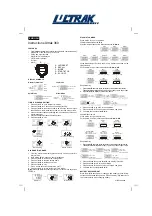
AFTER SALES SUPPORT
GB
IRE
00800/52323000
IRE
Start-up
GB
26
Finding satellites
In ideal conditions during a cold start, finding satellites
may take up to a few minutes or only a few seconds with
a warm start.
A cold start is at hand when you use the GPS watch for
the first time, haven’t used it for a prolonged period or
have covered a considerable distance since the last time
your position was determined (e.g. 300 km).
In this case, the GPS watch must retrieve the satellite
constellations again.
A warm start is possible when the GPS watch has not
covered a large distance since the last time the position
was determined and providing a considerable amount
of time has not passed. The more satellites have moved
out of the periphery of the GPS watch since the last
positioning, the longer it will take to find satellites.
For fast GPS reception, it is important that the watch
must be in an idle position and motionless.
Tip
: Before you start your workout, set your
GPS watch down in open terrain with an
unobstructed view of the sky (e.g. on a window
ledge or car roof) and activate workout or
interval mode (see sections “Workout mode”
and “Interval mode”) so that the GPS watch
starts looking for satellites.
The GPS icon
16
flashes while searching. As soon as
enough satellites are received, the icon will be illuminated
continuously.
















































